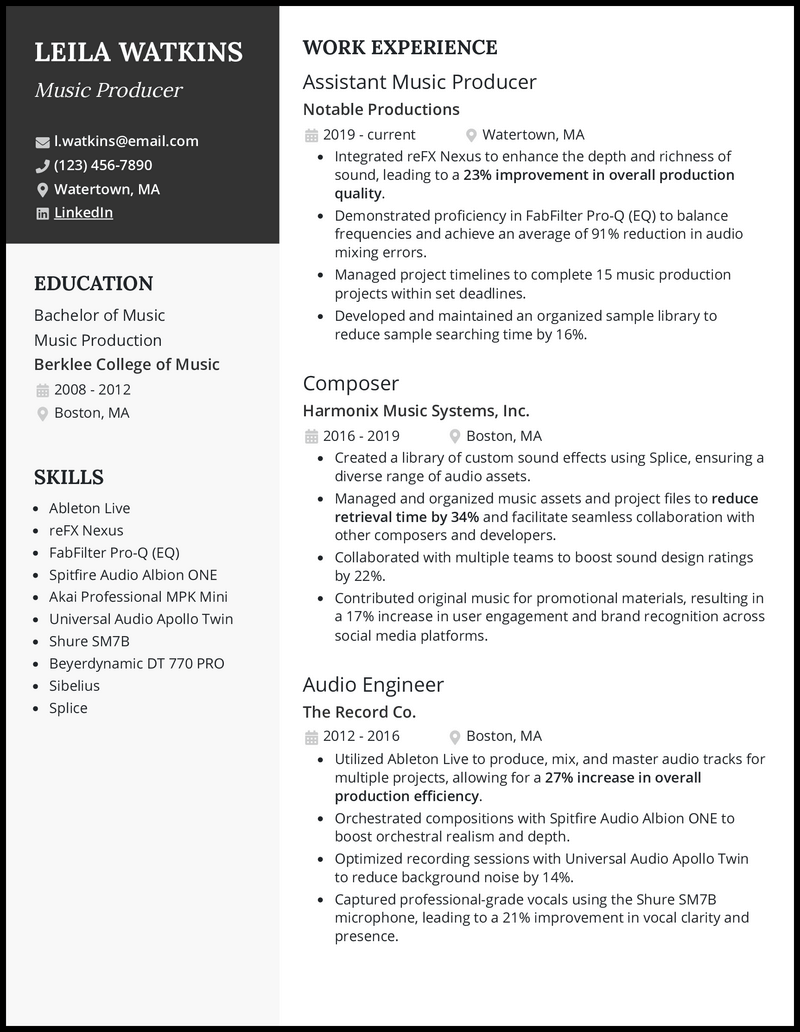As a music producer, you know everything there is to know about sound quality. One might say you have an excellent eye for detail, but in your case, your ears do most of the work, and your knowledge of sound production makes the magic happen.
Being a pro at your job takes more than just a keen ear—it requires the perfect balance of innovation, leadership, and technical abilities. But which skills do you pick to impress recruiters with?
Don’t worry—we know what to do. We’ve analyzed hundreds of job listings in your field, and our music producer resume examples and free cover letter builder will help you on your road to success!
Related resume examples
What Matters Most: Your Music Production Skills & Background

Be it songs, live vocals, or movie scores, you can turn something that sounds a little flat into a sonic masterpiece. This is where you can talk about the job skills that help you achieve that.
In your line of work, your mastery of DAWs is just as important as your in-depth knowledge of live production systems, virtual studio racks, and DJ software. You can choose the perfect skill set based on the job description.
List your preferred beat production and looping suites, such as FL Studio. Then, mention the tools you love to use for recording and post-production, like Audacity or Pro Tools. Finally, list the specific hardware you use, such as MIDI controllers like the Akai Professional MPK Mini.
9 best music producer skills
- Ableton Live
- Pro Tools
- Logic Pro X
- FL Studio
- Cubase
- Serato DJ
- FabFilter Pro-Q (EQ)
- Shure SM7B
- Maschine
Sample music producer work experience bullet points
While your music production skills are important, your work experience is how you show recruiters you know how to make the most of your know-how to create stunning music productions.
As an example, if you led an initiative to improve your company’s sound editing process, don’t forget to mention that you used Pro Tools to do so.
Then, to really make it pop, say that your initiative led to 29% shorter editing times and 22% improved sound quality. Hiring managers appreciate some carefully chosen metrics that emphasize your impact.
Here are some ideas:
- Integrated reFX Nexus to enhance the depth and richness of sound, leading to a 23% improvement in overall production quality
- Demonstrated proficiency in FabFilter Pro-Q (EQ) to balance frequencies and achieve an average of 91% reduction in audio mixing errors
- Utilized FL Studio to create unique beats, contributing to a 23% increase in demand for custom beat production
- Managed a music production budget of $120,000, delivering the project 13% under budget without compromising production quality
Top 5 Tips for Your Music Producer Resume
- Spotlight your creative process
- You’re a creative soul and an expert rolled into one—give recruiters a glimpse of your process to assure them of that. For instance, you could talk about how you tailored a unique sound for an artist based on their persona, significantly increasing their online following.
- Fit the genre
- Showing recruiters that you can adapt to the role’s musical style is crucial. If you’re applying to a hip-hop label, highlight your expertise in making beats with FL Studio. Similarly, for a rock label, focus on live sound engineering.
- Showcase your project management skills
- Leadership is key in music production. Talk about how you managed timelines, coordinated with various parties, and took projects to completion within budget and time constraints.
- Emphasize your musical fundamentals
- Your technical skills flourish thanks to your steady foundation of musical fundamentals. Highlight your background in music theory, detailing how this has helped you arrange compositions or enhance the quality of the music productions you’ve worked on.
- Highlight your technical expertise
- As a music producer, your technical skill set should be the main focus of your resume. Get into the specifics of your experience with DAWs like Ableton Live and Logic Pro X as well as equipment like the Shure SM7B.
It’s simple—just show off the diverse range of your projects. For example, even if you’ve mainly dealt with electronic dance music, don’t omit the acoustic sessions you organized for a live folk band.
The best way to do this is to make sure you’re following the job description closely. Let’s say that the job emphasizes live performances and electronic production; there’s your cue to talk about how you’re a pro at Ableton Live and FL Studio.
Unless you have more than a decade of experience as a music producer, it’s best to keep to a one-page resume. If you’re having difficulty fitting in all your work, prioritize the experience that’s most relevant to the role you’re applying for, especially in terms of music genre and key skills.








